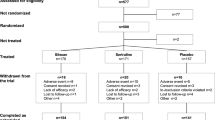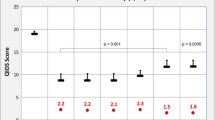Abstract
Purpose
Depressive symptoms often occur among women of reproductive age. In this article we perform an analysis of existing studies to examine a possible correlation between depression and the use of hormone-based contraceptives.
Methods
The computerized databases MEDLINE/PubMed were searched for studies examining the relation between depressive disorders and hormonal contraception of the years 1976–2010.
Results
Data on this topic are limited. At least two confounding variables influence the analysis of the available data and make it difficult to draw firm conclusions: the inconsistent use of the term “depression” and the large number of combined contraceptives which vary in their composition. The association between the use of oral contraceptives and depression is not clear. We found that depression is not a common side effect of hormone-based contraceptives.
Conclusion
Individual, patient-based decisions with consideration of the individual history and predispositions are recommended when starting oral contraceptives. If depressive symptoms or mood changes occur, decisions regarding discontinuation or medication change need to be made on an individual basis.
Similar content being viewed by others
References
Bitzer J (2011) Orale Kontrazeptiva und Depression. Gynäkologische. Endokrinologie 9:31–35
Borenstein J, Yu HT, Wade S et al (2003) Effect of an oral contraceptive containing ethinyl estradiol and drospirenone on premenstrual symptomatology and health-related quality of life. J Reprod Med 48:79–85
Dennis CL, Ross LE, Herxheimer A (2008) Oestrogens and progestins for preventing and treating postpartum depression. Cochrane Database Syst Rev CD001690
Duke JM, Sibbritt DW, Young AF (2007) Is there an association between the use of oral contraception and depressive symptoms in young Australian women? Contraception 75:27–31
Gonzalez-Olguin AR-GG, Malacara JM, De Diaz L, Medina J (1988) Personality profiles and socioeconomic factors in contraceptive use. Contraception 38:551–559
Graham CA, Ramos R, Bancroft J et al (1995) The effects of steroidal contraceptives on the well-being and sexuality of women: a double-blind, placebo-controlled, two-centre study of combined and progestogen-only methods. Contraception 52:363–369
Gupta N, O’brien R, Jacobsen LJ et al (2001) Mood changes in adolescents using depot-medroxyprogesterone acetate for contraception: a prospective study. J Pediatr Adolesc Gynecol 14:71–76
Huber JC, Heskamp ML, Schramm GA (2008) Effect of an oral contraceptive with chlormadinone acetate on depressive mood: analysis of data from four observational studies. Clin Drug Investig 28:783–791
Jacobi F, Wittchen HU, Holting C et al (2004) Prevalence, co-morbidity and correlates of mental disorders in the general population: results from the German Health Interview and Examination Survey (GHS). Psychol Med 34:597–611
Joffe H, Cohen LS, Harlow BL (2003) Impact of oral contraceptive pill use on premenstrual mood: predictors of improvement and deterioration. Am J Obstet Gynecol 189:1523–1530
Kay Cr CK, Kuennsberg Ev (1974) Oral contraceptives and health: an interim report from the oral contraception study of the Royal College of General Practitioners. The Whitfriars Press Ltd, London
Kulkarni J, Liew J, Garland KA (2005) Depression associated with combined oral contraceptives—a pilot study. Aust Fam Physician 34:990
Lawrie TA, Hofmeyr GJ, De Jager M et al (1998) A double-blind randomised placebo controlled trial of postnatal norethisterone enanthate: the effect on postnatal depression and serum hormones. Br J Obstet Gynaecol 105:1082–1090
Meirik O, Farley TM, Sivin I (2001) Safety and efficacy of levonorgestrel implant, intrauterine device, and sterilization. Obstet Gynecol 97:539–547
O’connell K, Davis AR, Kerns J (2007) Oral contraceptives: side effects and depression in adolescent girls. Contraception 75:299–304
Oddens BJ (1999) Women’s satisfaction with birth control: a population survey of physical and psychological effects of oral contraceptives, intrauterine devices, condoms, natural family planning, and sterilization among 1466 women. Contraception 59:277–286
Ramcharan SPF, Ray R (1981) The walnut creek contraceptive drug study: a prospective study of the side effects of oral contraceptives. Center for Population Research Monograph, Bethesda, pp 81–564
Rapkin AJ, Morgan M, Sogliano C et al (2006) Decreased neuroactive steroids induced by combined oral contraceptive pills are not associated with mood changes. Fertil Steril 85:1371–1378
Robinson SA, Dowell M, Pedulla D et al (2004) Do the emotional side-effects of hormonal contraceptives come from pharmacologic or psychological mechanisms? Med Hypotheses 63:268–273
Rosemeier (2001) Zur Psychologie der Kontrazeption. Frauenarzt:1120–1129
Rubino-Watkins MF, Doster JA, Franks S et al (1999) Oral contraceptive use: implications for cognitive and emotional functioning. J Nerv Ment Dis 187:275–280
Sanders SA, Graham CA, Bass JL et al (2001) A prospective study of the effects of oral contraceptives on sexuality and well-being and their relationship to discontinuation. Contraception 64:51–58
Schule C, Baghai TC, Rupprecht R (2007) New insights into the pathogenesis and pathophysiology of depression. Der Nervenarzt (78 Suppl)3:531–547 (quiz 548–539)
Segebladh B, Borgstrom A, Odlind V et al (2009) Prevalence of psychiatric disorders and premenstrual dysphoric symptoms in patients with experience of adverse mood during treatment with combined oral contraceptives. Contraception 79:50–55
Vessey M, Doll R, Peto R et al (1976) A long-term follow-up study of women using different methods of contraception—an interim report. J Biosoc Sci 8:373–427
Wagner KD (1996) Major depression and anxiety disorders associated with Norplant. J Clin psychiatry 57:152–157
Walloch Je KJ (2006) Psychische Begleitwirkung der Pille. Gynäkologische Praxis 30:272–275
Westhoff C, Truman C, Kalmuss D et al (1998) Depressive symptoms and norplant contraceptive implants. Contraception 57:241–245
Young EA, Kornstein SG, Harvey AT et al (2007) Influences of hormone-based contraception on depressive symptoms in premenopausal women with major depression. Psychoneuroendocrinology 32:843–853
Conflict of interest
We declare that we have no conflict of interest.
Author information
Authors and Affiliations
Corresponding author
Rights and permissions
About this article
Cite this article
Böttcher, B., Radenbach, K., Wildt, L. et al. Hormonal contraception and depression: a survey of the present state of knowledge. Arch Gynecol Obstet 286, 231–236 (2012). https://doi.org/10.1007/s00404-012-2298-2
Received:
Accepted:
Published:
Issue Date:
DOI: https://doi.org/10.1007/s00404-012-2298-2




